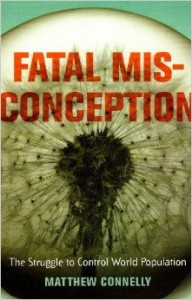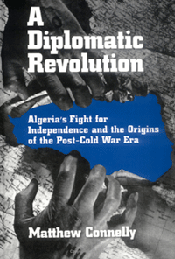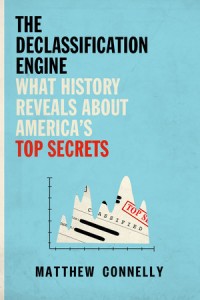The Declassification Engine: What History Reveal About America’s Top Secrets
The Declassification Engine is the first book-length study to come out of History Lab, and combines data science and history to uncover how government officials use secrecy to hoard power and evade democratic accountability. The Founders started a proud tradition of transparent government. But since World War II, we have radically departed from that open tradition, allowing intelligence agencies, black sites, and secret laboratories to grow unchecked. Using the latest techniques in data science, The Declassification Engine analyzes a vast trove of state secrets to unearth not only what the government really does not want us to know, but why. It is ultimately a study of power: of the greed that it enables, of the negligence that it protects, and of what we lose as citizens when our leaders cannot be held to account.
Fatal Misconception: The Struggle to Control World Population

Harvard University Press, 2008
Economist Book of the Year
Now available in paperback: Order from Amazon
Fatal Misconception is the first global history of a movement that sought to remake humanity- seemingly with the best of intentions-but succeeded in causing untold suffering. Wealthy foundations, foreign aid agencies, and the United Nations made “family planning” a means to plan other people’s families. Beginning with eugenics, the temptation to breed better people culminated in the sterilization camps of India and the horrors of China’s one-child policy. This history, based on research in over fifty archives in seven countries, serves as a warning against what may be the even more dangerous experiments of the future, including coercive pro-natalism and genetic “enhancement.”
Review Attention
A Diplomatic Revolution: Algeria’s Fight for Independence and the Origins of the Post-Cold War Era

Oxford University Press, 2002
Winner of the 2002 American Historical Association George Louis Beer Prize
Winner of the 2002 American Historical Association Paul Birdsall Prize in European military and strategic history
Winner of the 2003 Stuart L. Bernath Prize of the Society for Historians of American Foreign Relations
Winner of the Akira Iriye International History Book Award, The Foundation for Pacific Quest
Winner of the 2002 Edgar S. Furniss Book Award from the Mershon Center at Ohio State University
Order from Amazon
A Diplomatic Revolution describes how rebels can harness their cause to global trends to isolate and defeat an empire. It happened a half century ago, at the height of the Cold War, when Algerian nationalists mobilized Muslim immigrants in France and across Europe, staged urban terror to attract the international media, and finally won over the U.N. without ever liberating national territory. Rewriting the rules of international relations, they inspired revolutionaries worldwide, including the ANC and the PLO. It is also a textbook case of how a counter-insurgency campaign can win all the battles and still lose the war.
Review Attention
L’arme Secrète du FLN: Comment de Gaulle a Perdu la Guerre d’Algérie
Payot & Rivages, 2011
Order from Amazon
Comment le FLN a-t-il fait, alors que ses troupes étaient écrasées par l’armée française, pour amener de Gaulle et le gouvernement de la France à accepter l’indépendance ? La réponse se trouve bien au-delà des frontières de l’Algérie, car c’est sur la scène internationale que les nationalistes ont livré leurs combats les plus décisifs. Leurs meilleures armes furent psychologiques et médiatiques. Rapports sur les droits de l’homme, conférences de presse, congrès de la jeunesse, etc., furent utilisés pour alerter l’opinion mondiale et invoquer les lois internationales dans un contexte qui était également celui de la guerre froide. Soutenus par des pays aussi divers que l’Arabie Saoudite et la Chine communiste, les Algériens finirent par rallier une majorité contre la France aux Nations unies. Ainsi vinrent-ils à bout d’un président et d’un gouvernement désormais obsédés par l’impact de la guerre sur la réputation de leur pays à l’étranger. Un exemple pionnier qui allait inspirer l’OLP d’Arafat, ou encore l’ANC de Mandela.

